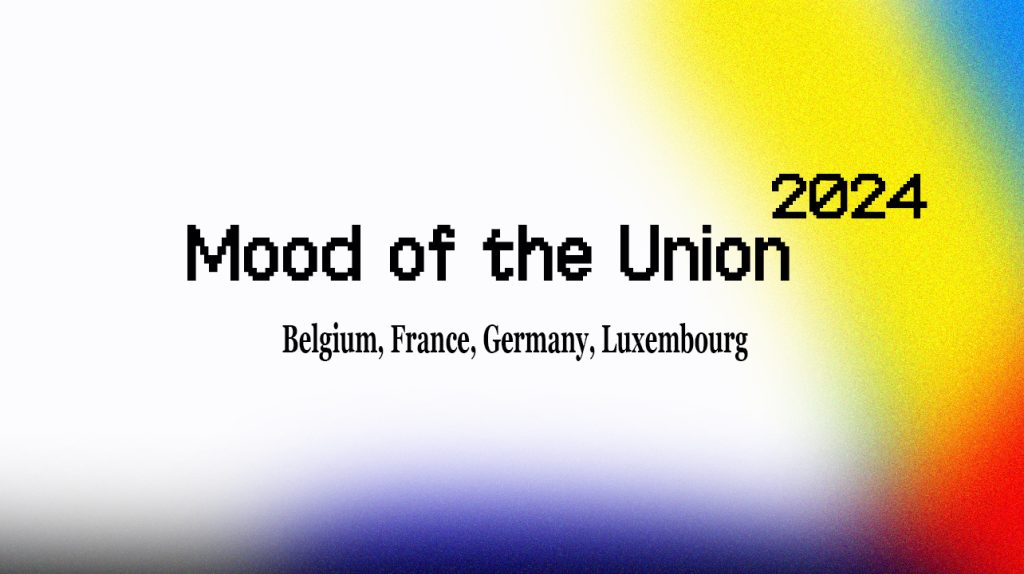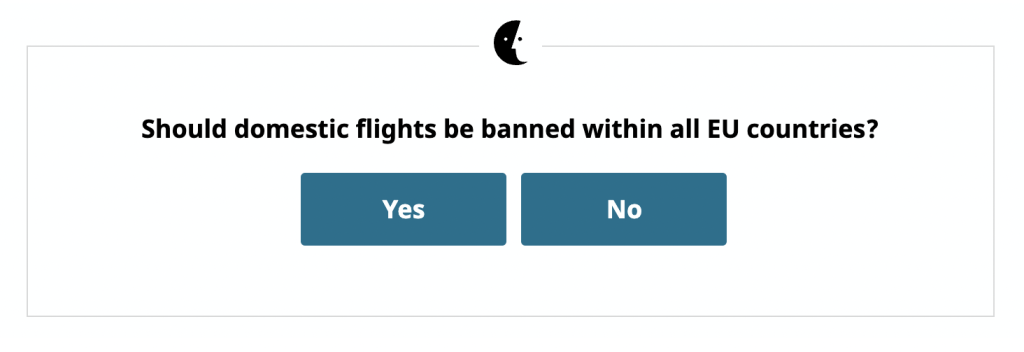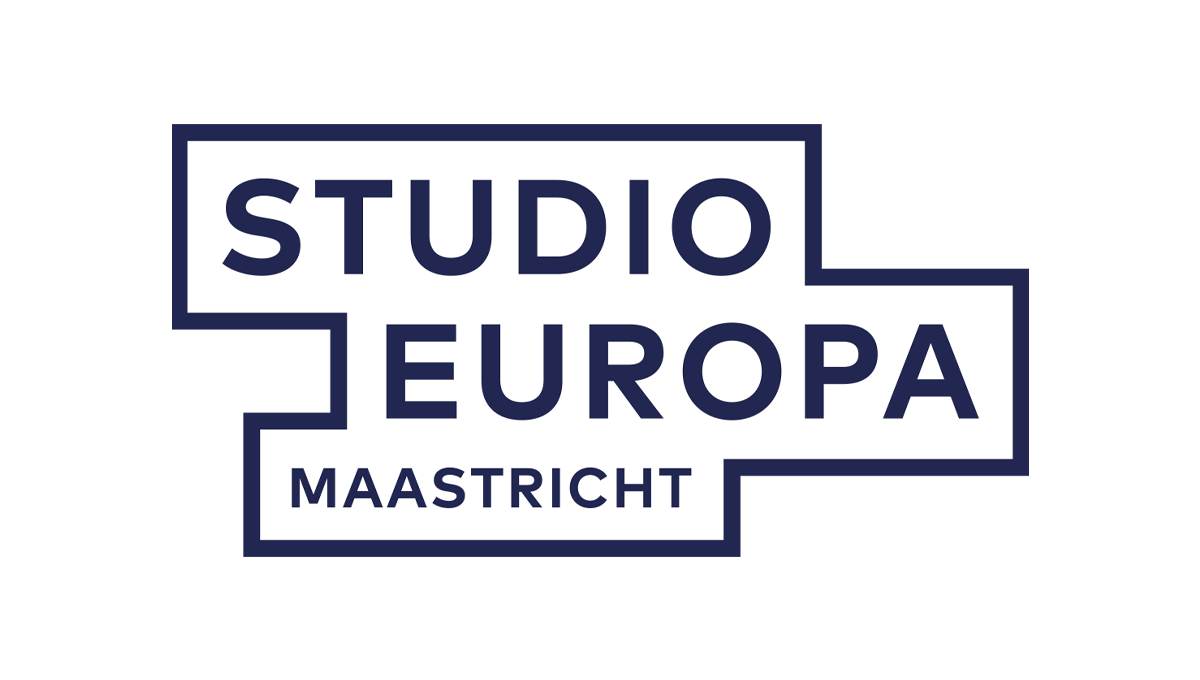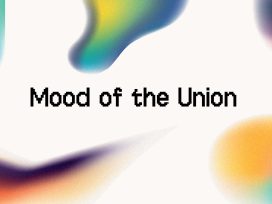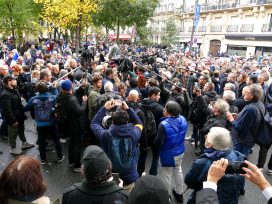In the run up to the European Parliament election, popular discontent pervades the bloc’s core. Despite robust opposition, the far right is the only force gaining strength. More than ever, the EU’s global ambitions depend on public approval for national governments.
On the eve of the European Parliament elections, the mood in some of the EU’s oldest member states is one of strong apprehension about what lies ahead. There is also a palpable sense of popular anger, as evidenced by strikes and popular mobilizations of various kinds, and polls suggesting a growing protest vote – generally in favour of the far-right.
In Germany, a country with particular sensitivities towards this threat, a strong countermovement has taken shape, and in Belgium’s French-speaking region there is also heightened vigilance and a renewed commitment to a traditional refusal to provide a platform for far-right voices.
The situation is very different in France, where the normalization of the far-right has long been underway; this is also increasingly the case in Belgium’s Flanders region. Even Luxembourg seems susceptible to the risk, with some politicians moving further to the populist right. With a political agenda playing to the far right’s strengths, especially on the topics of migration, security and agriculture, the centre’s ability to hold is in greater doubt than ever.
Across these countries, worries about the potential escalation of the conflicts in Ukraine and the Middle East, as well threats posed by global powers, have boosted support for greater defence spending. Yet, as with the ecological transition – also a priority for many – such policies incur tough budgetary decisions, and governments risk appearing to cross a line whereby social welfare is undercut and sections of the population are unjustly penalised. Farmers, motorists and those on lower incomes are among those groups to have expressed anger and sense of being unfairly targeted. Across the political spectrum, there is little consensus on how to make the numbers add up, with the divides among policymakers mirrored among citizens.
At a European level, setting ambitious spending commitments is further complicated when member states – particularly powerful ones like France and Germany – do not see eye to eye. In the absence of Franco-German alignment on key issues such as security and defence, it has been possible in some cases for the EU to make use of instruments to take action regardless.
Yet, with a Commission President accused of overreach on foreign policy in the Middle East, Brussels must tread carefully. National actors forging bilateral agreements based on their own interests can still undermine the EU’s aspirations for an integrated approach to the challenges facing the bloc, and its ambitions of being a powerful, sovereign global player.
France
In his speech at the Sorbonne University in April 2024, French President Emmanuel Macron made the case for building a ‘powerful Europe’. The vision he set out, rooted in ‘strategic autonomy’ for Europe, was in keeping with his 2017 speech in the same forum. This time, however, there was a greater sense of urgency and a heightened focus on security and defence in response to global threats, especially from Russia and China.
Given the proximity of the European elections, commentators suggested Macron was attempting to bring the debate back to Europe, where he believes his political strength lies. Yet it seems that French voters are unconvinced: a survey published just before the speech revealed 57% believe the president has had no ‘real influence’ on EU politics since assuming office in 2017.
Macron’s aspiration for the EU to speak with a single voice on the global stage, as well as for greater coordination at a European level on defence, strategic industries (such as AI and biotechnology) and common financing, are largely shared by EU Commission President Ursula von der Leyen. German Chancellor Olaf Scholz, however, has been more hesitant to engage in the process of building a more political Europe; Macron’s multiple references to the Franco-German couple were a clear appeal to his German counterpart in this regard.
Scholz’s reticence may express a mistrust rooted in the fundamentally different approaches of the two countries. As a nuclear power, France has long called for a strong Europe with its own defence capacities, while Germany has maintained a more transatlantic orientation, with a greater focus on NATO than the EU’s Common Security and Defence Policy. Recent disagreements between France and Germany include nuclear power, arms exports, missile defence for Europe, and whether to send ground troops to Ukraine.
Macron has been accused of hypocrisy for talking tough on Russia regarding sanctions while continuing to consume Russian gas. Yet a shift could be underway, with France’s government prioritising commitments to European security over national foreign policy ambitions. Combined with reciprocal visits by the French and German leaders, this suggests potential for a warming of relations.
But the French president’s lofty global ambitions seem out of step with the bread-and-butter concerns of the population. Polls conducted at the end of 2023 suggest priority topics are health and rising costs and inflation. These concerns are felt among virtually all sections of French society. Students are struggling to meet unprecedentedly high living costs, while health insurance increases have been sharply felt by older citizens. Immigration is also a key issue: 59% of French respondents to an EU-wide poll believe the fight against illegal migration should be a priority. Given that around half of French voters see the European Parliament elections as a way to express their opinion on national politics, it seems unlikely that Macron’s visions for Europe will resonate among the French electorate.
The farmers’ protests in France were a clear indicator that internal divisions are deepening amidst growing dissatisfaction. The pressures, exacerbated by a combination of the pandemic, increased costs, the influx of Ukrainian grain, and extreme weather, have sparked broad mobilization. Both national and EU policies supporting fossil fuel reduction, organic farming and biodiversity preservation are propelling this movement.
The legislation, both at the EU and national levels, along with a proposal in France’s 2024 budget to end the tax exemption for diesel in agriculture, are seen as excessive. Farmers are feeling abandoned by governments that once prioritized their interests for electoral gain. Already a sector in decline, as younger generations seek better prospects elsewhere, many farmers feel that without significant investment and reform, the future of their livelihoods is at stake. These are not merely perceptions: research has predicts that the proposed EU rules will lead to a significant fall in agricultural production in Europe, along with a sharp increase in exports and massive price rises.
Polling from earlier this year suggested much sympathy with the plight of farmers: nine of out 10 people in France support their movement. Still, this solidarity may now be falling due to the cost-of-living crisis. The far-right has sought to turn the farmers’ pleas to its advantage. The Rassemblement National (RN) and its leader Marine Le Pen have been vocal in calling for the scrapping of regulation and in condemning national and European governments for betraying farmers. The latest polls of voting intention at the European Parliament election put RN at 31%, far ahead of its closest competitor, Macron’s centrist La République en Marche/Ensemble at 16%, which was followed by the Socialist Party at 13%.
The farmers’ protests reflect broader grievances shared by other groups like teachers, caregivers and firefighters, all of whom feel they are being squeezed financially and in terms of time and resources, as well as lacking recognition and agency over the decisions that affect them. But despite its scale, the mobilization is not a broad movement like the Gilets Jaunes. Rather, it is anchored in professional and trade union frameworks, which remain powerful in France despite declining membership. Although it has a clear pan-European dimension, the mobilization is unlikely to spread to other sectors.
Germany
The European Parliament election will be an important test for Germany’s ‘Traffic light’ coalition, formed of the Social Democratic Party, the Greens and the liberal Free Democratic Party. It comes at a difficult time for Scholz (SDP), who faces low approval ratings and rifts within the coalition.
A crucial point of disagreement among the parties concerns how to tackle the country’s economic stagnation. Finance minister Christian Lindner (FDP) has called for tax cuts and has defended the country’s debt brake (a constitutional constraint on public borrowing). The Social Democrats and Greens, on the other hand, are in favour of relaxing limits to allow governments more room for manoeuvre, arguing that investment is key to restoring growth and protecting the welfare of citizens.
As elsewhere in Europe, the public sees security and defence as important issues. A recent poll showed that a significant majority (67%) of Germans see peace and security in Europe as under serious threat. Most Germans believe the EU has a key role to play in securing peace –59% would support a joint EU army, and 82% see NATO to be of key importance in ensuring peace in Europe.
Yet Scholz’s attitude has been inconsistent. In setting out his vision for security and defence in 2022 (the Zeitenwende or ‘new era’), Scholz committed to boosting Germany’s military capabilities with the creation of a special 100-billion-euro fund, while also phasing out its dependence on Russian energy supplies. The country became the biggest European provider of aid to Ukraine and Germany is now on course to hit Scholz’s target of spending 2% of GDP annually on defence. These moves have largely been met with public approval, following a successful campaign by the defence minister Boris Pistorius, directed at both policymakers and the public.
But converting these pledges into concrete policies and budget allocations for the future has proved difficult. Disagreements within the coalition about how to find the funding to maintain such levels of spending mirror broader differences on the economy. The mobilising power of Russia’s invasion of Ukraine also appears to be waning. Scholz recently led a delegation of German business representatives to China with the aim of securing investment and access to Chinese markets for German manufacturers. Designed to protect the national economy, the trip appeared very much at odds with current statements at the EU level and from other European governments stressing the threat posed by China.
Reaping the benefits of the coalition’s woes are the conservative Christian Democratic Union / Christian Social Union (CDU/CSU) and the far-right Alternative for Germany (AfD), which according to recent polls are leading at 30% and 18% respectively. The AfD is in top position in most of the former east German states, some of which have elections coming up later in the year, and the party made important gains in last year’s state elections in Bavaria and Hesse.
In response, hundreds of thousands of people have been taking to the streets in cities across the country to denounce the AfD and its policies. The movement was triggered by reports that AfD representatives had participated in a secret meeting of far-right figures, where plans for the mass expulsion of migrants were discussed. There have recently been allegations of AfD candidates colluding with Russian and Chinese spying and accepting payments from these governments in return for influence and information. But whether this will discredit the party in the eyes of voters remains to be seen.
While most parties have ruled out working with AfD, there is fierce debate about what steps should be taken to reinforce the country’s ‘firewall’ to prevent the far-right reaching power. While some call for the party to be sanctioned and excluded from debates in the media, others argue that such a move could backfire, particularly given the large following of many AfD candidates on social media networks.
There is some overlap between the AfD’s poll ratings and the farmers’ protests – both being situated in the east of the country, a less prosperous region overall. While the majority of farmers in Germany favour conservative policies over those of the far-right, an increasing number could adopt more radical positions if the AfD successfully exploits urban-rural cleavages and Euroscepticism. Like in France, the protests in Germany were triggered by EU-level policies as well as a tax on agricultural diesel (on which the government has now conceded). Farmers were also joined by drivers and traders in protesting against rises in tolls and carbon taxes on vehicles.
The various mobilisations taking place across the country attest to a sense of anxiety and alarm among many segments of the population and illustrate the sharp divisions that characterise the political landscape. The tensions are also evidenced by the increasing incidence of physical attacks on policymakers, leading some to warn that if the country’s heated public debate boils over, its democratic values themselves may be at risk.
Belgium
On 9 June, voters in Belgium will not only elect their European representatives but also the members of the country’s federal and regional parliaments. A total of six elections will be taking place simultaneously, in which twelve major parties will compete. This large number owes to the fact that both linguistic communities (Francophone and Flemish-speaking) have distinct party systems.
Since 2020, Belgium has been governed at a federal level by a coalition of seven parties from both sides of the main linguistic divide, drawn from four political families (Social Democrats, Greens, Christian Democrats and Liberals, hence the tag ‘Vivaldi coalition’) and led by liberal Flemish Prime Minister Alexandre De Croo. Fielding the numerous challenges it has faced over that period – the pandemic, the cost-of-living crisis and the invasion of Ukraine – has not been simple task for such a broad coalition.
Despite this, the government has overseen some important breakthroughs. For example, it was able to adopt a pension reform, make a significant investment in public transport, and a launch a new defence strategy. But elsewhere it has faltered, failing to agree on much-needed tax reform, and allowing provision for asylum seekers to reach crisis point. Overall, however, the fact that the government saw through its term without major incident is seen as evidence that Belgian politics may be moving into a period of greater stability (following the collapse of the administration in 2018, leaving Belgium without a functioning majority government for almost two years).
Nevertheless, the alliance ends its mandate on a note of division; the francophone Greens and Liberals have found themselves at odds in their positions on migration and the far right. Some view the Liberals as failing to respect the ‘cordon sanitaire’ – a political and media red line excluding far-right politicians from political debates that emerged in response to breakthroughs by the Flemish far-right in the early 1990s.
The latest polls of voting intention for the federal elections show the far-right separatist Vlaams Belang leading in Flanders at around 27%. In French-speaking Wallonia, the Socialist Party is ahead with 25%, though the radical left Belgian Workers’ Party (PTB) has been rising. In Brussels, the Liberals lead with 23% and the overall tendency is more centrist.
The predominance of the Vlaams Belang in Flanders means that engaging with the far-right force is becoming an inevitability. The attitudes of certain parties and civil society organisations suggest an increased openness in this direction, which is likely to cement its normalisation. As in Germany, there have been repeated allegations of collusion with China and Russia, but whether this will discredit the far right in the eyes of voters remains to be seen.
Despite the differences in the political landscapes of Belgian’s regions, there is considerable overlap in terms of citizens’ priorities and areas of concern. According to recent surveys, purchasing power is the greatest concern for voters in Wallonia and Brussels, followed by migration, health and security (Belgium has recently experienced some of the highest rates of inflation in the EU and there has been a widespread perception of diminishing living standards). Security is a particularly salient issue in Brussels and has risen sharply as a concern in recent months. This is likely due to shootings linked to the drug trade in the capital. In Flanders, migration is viewed as the most important issue, followed by purchasing power, health and tax.
In this context, and especially in light of the multiple elections taking place on the same day, the European elections are likely to be eclipsed by national and regional ones, with national issues dominating the debate.
Luxembourg
Although almost half of Luxembourg’s population is ineligible to vote at the national level, the results of the general elections that took place in October 2023 in Luxembourg might be the strongest indicator available of voting behaviour at the upcoming European elections. The centre-right Christian Social People’s Party (CSV) won with 29%, while the liberal Democratic Party (DP) and the Socialist Workers’ Party (LSAP) both ended on 19%. Luxembourg’s government is now formed of a coalition between the CSV and the DP, with the leader of CSV, Luc Frieden, prime minister.
In March 2024, Luxembourg held its ‘social elections’. Open to all those working in the country, including cross-border employees (more than 600,000 eligible voters) – this is effectively the largest and most democratic election in Luxembourg. Workers vote for their representations at the chamber of employees (CSL) and elect the members of the staff delegations in the companies for which they work. But at 34%, turnout was low. This has led some to question the legitimacy of trade unions as representatives of Luxembourg’s workforce.
Despite dwindling membership, the unions see themselves as a crucial counterweight to a government viewed by many as biased towards employers and big business. On 1 May this year, union leaders called on the government to reform the tax and pensions system, take stronger measures to tackle poverty, and protect the rights of cross-border workers (around 200,000 of whom commute to the country for work each day). They also sounded the alarm regarding the potential rise of the far-right in Luxembourg.
There is a debate over to what extent the far-right is already present in the Luxembourg political landscape. Though not a far-right party, the Alternative Democratic Reform Party (ADR), which won 9% at the 2023 elections, has been referred to as such by political rivals and is certainly the most right-leaning party on the political spectrum. It has become increasingly radical and nationalist in its positions, notably on the topics of migration and gender. This has raised questions as to whether Luxembourg should make efforts to guard against far-right ideas, similar to the stance against platforming taken the French-speaking region of Belgium.
Rather than tolerance, it is the absence of an economic crisis in Luxembourg, comparatively high levels of prosperity and general approval for the economic model that some experts say account for the lack of a strong far-right force. If the economic situation changed rapidly, Luxembourg could be confronted with a growing far-right force, particularly if the ADR decided to whip up nationalist sentiment on sensitive issues, for instance the perceived decline of the nation and national language.
Ahead of the legislative elections, housing was a major issue for voters, sparking street demonstrations in response to a lack of affordable housing, soaring rents and construction costs. For many voters, successive governments were guilty of failing to act to regulate the housing market, while allowing rampant speculation and wealth accumulation. This could continue to become a mobilising point of discontent if the government fails to convince voters that the housing crisis is turning a corner.
When it comes to the agricultural mobilisation so prominent in neighbouring countries, things look very different in Luxembourg. While farmers did demonstrate in late 2022 against a new agricultural law, a satisfactory compromise was reached, and farmers in Luxembourg feel somewhat shielded from the challenges facing their French and German counterparts. Yet the country’s farmers are also affected by rising production costs and, again, the situation may evolve rapidly. There is increasing anxiety about the lack of investment in long-term perspectives for farmers, particularly younger generations.
Prospects
Faced with an uncertain future, there is an overarching sense of apprehension and trepidation among many citizens in the core European states. In the electoral campaigns so far, populist rhetoric, disinformation and foreign interference have undermined public debate and heightened mistrust. How can parties and candidates competing in these elections address and alleviate the fears of citizens?
They will need to confront a fundamental dilemma: how to make sovereign and democratic decisions that protect populations when external forces exert a strong influence on national economies and impact on the social model. Failing to address this question will leave citizens feeling increasingly disenfranchised, with uncertain political consequences.
But the situation also presents opportunities for European politics. The security-related anxieties of European citizens is fuelling a desire to bolster the EU’s military power. A 2023 Eurobarometer survey showed around 80% support increased defence cooperation and 77% a coordinated purchase of military equipment. At the same time, defence remains one of the least integrated of EU policy areas.
Looking beyond the European Parliament elections, a unifying factor could be a second Trump presidency. The former US president’s statements on NATO have already led to a reinforcement of alliances such as the ‘Weimar Triangle’ between France, Germany and Poland. The shocks of Trump’s first victory, Brexit, the pandemic and the invasion of Ukraine have each brought with them opportunities to boost European integration and consolidate unity. Harnessing the momentum of such moments will be a crucial challenge for the next cohort of European leaders.
Published 17 May 2024
Original in English
First published by Eurozine
© Beatrice White / Eurozine
PDF/PRINTIn collaboration with
In focal points
Newsletter
Subscribe to know what’s worth thinking about.
Related Articles

The popularity of Sahra Wagenknecht’s brand of leftwing conservatism may guarantee her eponymous alliance a place in up to three state governments in eastern Germany. But in the West, her pro-Russian stance is seen as toxic.

The privilege of anxiety
On censorship, self-censorship and Palestine
A conversation with Palestinian–German scholar Anna-Esther Younes about the mechanisms of anti-Palestinian repression in Germany, Europe and beyond; about intergenerational knowledge transfer amidst an increasingly isolating political climate; and about fostering solidarity between struggles.
